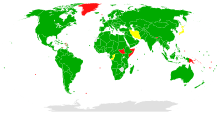United Nations Convention against Transnational Organized Crime
|
Signed and ratified or acceded
Only signed
Non-party | |
| Type | Organized crime; international criminal law |
|---|---|
| Drafted | 15 November 2000 |
| Signed | 12 December 2000 |
| Location | New York City, United States |
| Effective | 29 September 2003 |
| Condition | 40 ratifications |
| Signatories | 147 |
| Parties | 187 |
| Depositary | Secretary-General of the United Nations |
| Languages | Arabic, Chinese, English, French, Russian, and Spanish |
The United Nations Convention against Transnational Organized Crime (UNTOC) is a 2000 United Nations-sponsored multilateral treaty against transnational organized crime. The Convention was adopted by a resolution of the United Nations General Assembly on 15 November 2000. It is also called the Palermo Convention, and its three supplementary protocols (the Palermo Protocols) are:[1]
- Protocol to Prevent, Suppress and Punish Trafficking in Persons, especially Women and Children; and
- Protocol against the Smuggling of Migrants by Land, Sea and Air.
- Protocol against the Illicit Manufacturing and Trafficking in Firearms
All four of these instruments contain elements of the current international law on human trafficking, arms trafficking and money laundering. The United Nations Office on Drugs and Crime (UNODC) acts as custodian of the UNTOC and its protocols.
The Convention came into force on 29 September 2003. As of June 2016, it has 187 parties,[2] which includes 182 United Nations member states, the Cook Islands, the Holy See, Niue, the State of Palestine, and the European Union. The 11 UN member states that are not party to the Convention are (* indicates that the state has signed but not ratified the Convention):
See also
References
- ↑ "UNITED NATIONS CONVENTION AGAINST TRANSNATIONAL ORGANIZED CRIME AND THE PROTOCOLS THERETO" (PDF). UNITED NATIONS OFFICE ON DRUGS AND CRIME. 2004. p. V. Retrieved 16 July 2011.
- ↑ UN Convention against Transnational Organized Crime: Treaty status
External links
- UNODC site.
- Text of convention and protocols.
- Signatures and ratifications.
- Procedural history, related documents, photos and videos on the United Nations Convention against Transnational Organized Crimes (with protocols) in the Historic Archives of the United Nations Audiovisual Library of International Law
